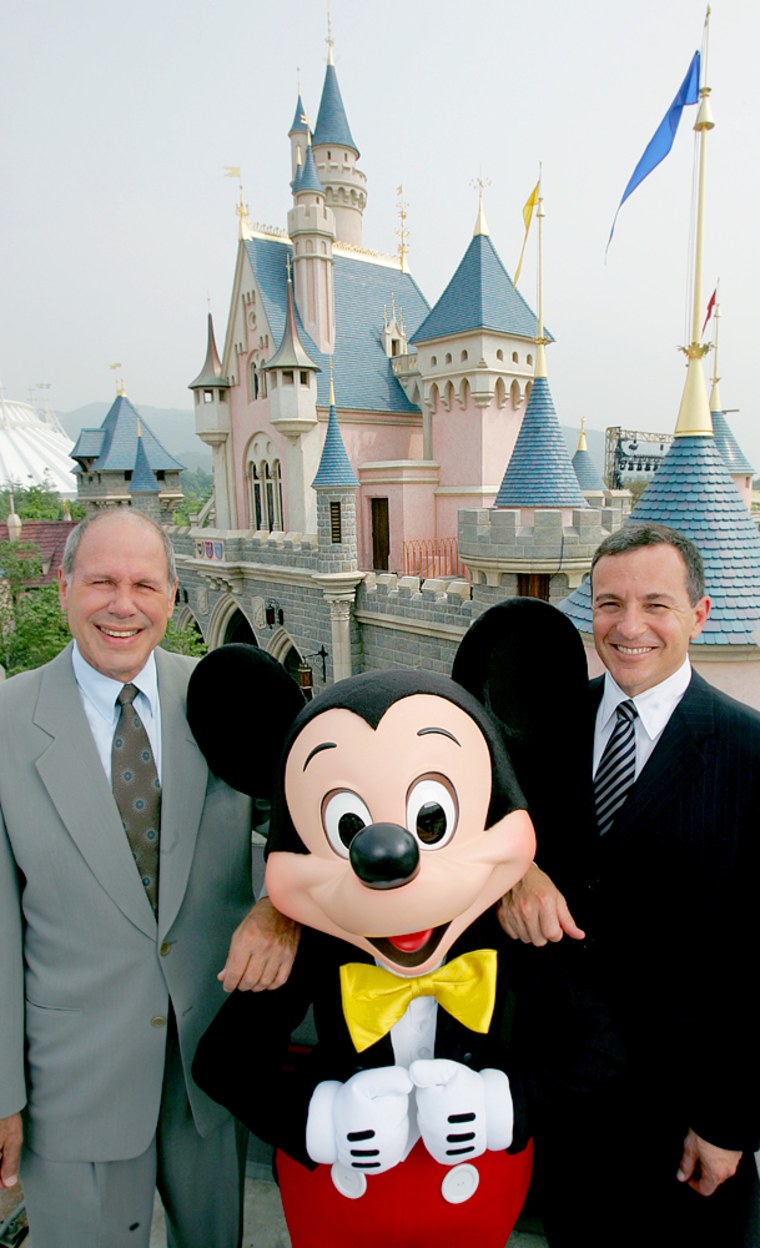Three weeks before his departure as one of the entertainment industry’s most influential — and controversial — executives, Walt Disney Co. chief executive Michael Eisner chose to focus on the future rather than reflect on his sometimes stormy past.
One of Eisner’s last acts after 21 years leading The Walt Disney Co. is to preside over the opening of Disney’s 11th theme park, Hong Kong Disneyland, which opens Monday.
Under Eisner, the company expanded its theme park business overseas, opening parks in Paris and Tokyo. It also expanded existing parks in Florida and California.
In an interview with The Associated Press, Eisner deflected questions about the more turbulent years of his tenure at Disney.
“You should have seen the turbulence at my fraternity house,” the 63-year-old executive said.
Eisner survived a shareholder revolt last year, but was stripped of his chairmanship of the company after two disgruntled board members led a campaign to oust him.
Soon after, Eisner unexpectedly announced his intention to retire from the company when his contract expired in Sept. 2006. He later offered to leave a year earlier after the Disney board choose president and chief operating officer Robert Iger as his successor.
With the new “Space Mountain” dome behind him, Eisner seemed upbeat and enthusiastic about his Disney departure and avoided naming some of the people he battled with in his last years at the helm.
“There is turbulence. Life is turbulence. Life isn’t only Disneyesque,” Eisner said. “Disneyesque is the end result of trying to do it better. A lot of people don’t like to try to do things better. A lot of people like to take the easy road, short cuts. Some people even take the unethical cuts. We’ve never done any of that.”
One of Eisner’s biggest conflicts was the short-lived hiring of superagent Michael Ovitz as Disney president in 1995. Ovitz clashed with Eisner and other executives, and he left 14 months later with a $140 million severance package.
The payment sparked a shareholder lawsuit, and a U.S. court ruled last month that Disney’s board didn’t breach its fiscal responsibilities by paying Ovitz the money.
But the court criticized Eisner for not adequately involving the board in business matters and having “enthroned himself as the omnipotent and infallible monarch of his personal Magic Kingdom.”
Eisner said that hiring Ovitz wasn’t his worst decision. He said his biggest mistake was acquiring baseball star slugger Mo Vaughn for the then Disney-owned Anaheim Angels team. Vaughn was paid $80 million, but he injured his ankle in his first game for the team.
Acquiring Vaughn “was the worst personnel move I’ve ever made or approved, worse than the one you’re probably thinking about,” Eisner said, in an obvious reference to Ovitz.
Eisner praised Iger, who becomes CEO on Oct. 1. Iger joined Disney in 1996 when the company acquired Capital Cities/ABC, where Iger was president and chief operating officer.
“We have a great new CEO,” Eisner said about Iger. “I’ve known him a decade and he understands broadcasting. He understands the creation of product.”
The company is now on a push to conquer the tougher Asia market. Disney said it is in discussions to open a second China park, most likely in Shanghai, sometime in the next decade.
The company’s efforts have not always been successful. The two Paris parks are still struggling to turn a profit and attendance at its second California park remains below expectations.
Still, Eisner predicted the Hong Kong park would be a hit in large part because it emphasizes family fun.
“A company that pays attention to the family unit is a successful company,” Eisner said. “We don’t isolate the family. We don’t make rides that say, ’Hey mom, dad, you go sit on the bench.”’
Eisner declined to say what he plans to do next after Disney. But he hinted that he still wanted to be involved in a major entertainment company, saying he wanted to be involved “in a large scale, not a one-off scale.”
“I can’t imagine that I wouldn’t do anything that wasn’t in the area of making fun and watching audiences be excited,” he said, “whether they’re watching a DVD or in a Broadway theater or an ice show or a big movie screen or on a cell phone.”
